
Journal of Tropical Meteorology
Scope & Guideline
Deciphering the Dynamics of Tropical Weather Systems
Introduction
Aims and Scopes
- Tropical Cyclone Research:
The journal emphasizes studies on tropical cyclones, including their formation, intensity, and impact forecasting, utilizing numerical models and observational data. - Precipitation and Hydrometeorology:
Research on precipitation processes, including heavy rainfall events, their prediction, and the hydrological cycle in tropical and subtropical regions is a core focus. - Climate Variability and Change:
The journal addresses climate variability, including monsoon dynamics, seasonal forecasting, and long-term climate trends, particularly in East Asia and surrounding regions. - Advanced Forecasting Techniques:
Innovative methodologies in numerical weather prediction, including ensemble forecasting, machine learning, and radar data assimilation, are explored to improve forecast accuracy. - Mesoscale Weather Phenomena:
Studies of mesoscale convective systems, their organizational structures, and interactions with larger weather systems, are pivotal in understanding localized weather events. - Remote Sensing Applications:
The journal promotes the application of remote sensing technologies for meteorological observations, including satellite data analysis and radar technologies.
Trending and Emerging
- Deep Learning and AI in Meteorology:
There is a significant increase in research utilizing deep learning and artificial intelligence for precipitation forecasting and climate modeling, showcasing a shift towards data-driven methodologies. - Multi-Source Data Integration:
Emerging studies focus on integrating multiple data sources, including satellite, radar, and ground observations, to enhance the accuracy of weather predictions and analyses. - Climate Change Impact Studies:
Research exploring the impacts of climate change on tropical weather patterns and phenomena is gaining prominence, reflecting a broader global concern about climate variability. - Urban Meteorology:
The influence of urbanization on local weather patterns and climate is increasingly being studied, particularly in relation to heat islands and precipitation changes in urban environments. - Advanced Radar and Remote Sensing Techniques:
There is a rising interest in utilizing advanced radar systems and remote sensing technologies for real-time monitoring of meteorological phenomena, enhancing observational capabilities.
Declining or Waning
- Traditional Statistical Methods:
There has been a noticeable decrease in the use of traditional statistical forecasting methods, as more researchers adopt advanced computational techniques like machine learning and ensemble forecasting. - Localized Case Studies:
While localized studies were once prevalent, there is a shift towards broader regional analyses and global models, leading to fewer publications focusing solely on specific localized events. - Historical Climatology:
Research focused on historical climatological data is waning, possibly due to a greater emphasis on real-time forecasting and predictive modeling rather than retrospective analyses. - Surface Observation Techniques:
The reliance on ground-based surface observation techniques appears to be declining as researchers increasingly utilize satellite and remote sensing technologies for comprehensive data acquisition.
Similar Journals

Weather and Climate Dynamics
Innovating Understanding in Atmospheric SciencesWeather and Climate Dynamics, an esteemed journal published by COPERNICUS GESELLSCHAFT MBH, focuses on the intricate relationships and processes governing climate and weather patterns, advancing our understanding of atmospheric sciences. Since its launch in 2020, this Open Access journal has rapidly gained recognition, achieving a commendable Q1 status in Atmospheric Science and ranking 39th out of 148 journals in the Earth and Planetary Sciences category, placing it in the 73rd percentile. Based in Germany, the journal aims to provide a platform for innovative research, sharing crucial findings that contribute to tackling global climate challenges. Researchers, professionals, and students alike are encouraged to explore the wealth of knowledge contained within its pages, as it continues to shape the discourse on weather and climate dynamics through rigorous and impactful scholarship.
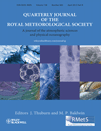
QUARTERLY JOURNAL OF THE ROYAL METEOROLOGICAL SOCIETY
Exploring the frontiers of weather and climate science.The Quarterly Journal of the Royal Meteorological Society, published by Wiley, stands as a prestigious platform in the field of Atmospheric Science, with a commendable impact reflected in its Q1 quartile ranking and a notable Scopus rank of 4th out of 148, placing it in the 97th percentile among its peers. With origins tracing back to 1873, this journal has established itself as a cornerstone for disseminating high-quality research, engaging articles, and innovative methodologies that advance our understanding of meteorological phenomena. Although it is not an open-access journal, the rigorous peer-review process ensures that only the most significant contributions are published, making it essential reading for researchers, professionals, and students dedicated to atmospheric and planetary sciences. For those interested in cutting-edge findings and comprehensive reviews, the Quarterly Journal of the Royal Meteorological Society is an invaluable resource in enhancing scientific knowledge and collaboration in this dynamic and evolving field.
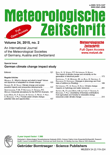
METEOROLOGISCHE ZEITSCHRIFT
Bridging Theory and Practice in Meteorological ScholarshipMETEOROLOGISCHE ZEITSCHRIFT is a distinguished academic journal dedicated to the field of meteorology and atmospheric sciences, published by E SCHWEIZERBARTSCHE VERLAGSBUCHHANDLUNG. With an ISSN of 0941-2948 and an E-ISSN of 1610-1227, this journal has been an invaluable resource for researchers, professionals, and students since its inception. It has embraced an Open Access model since 2014, promoting wider dissemination of research findings. Based in Stuttgart, Germany, the journal is recognized for its rigorous peer-review process and is currently positioned in the Q3 quartile for Atmospheric Science as per the 2023 category rankings. Additionally, it ranks #97 out of 148 in the Scopus database, placing it in the 34th percentile among Earth and Planetary Sciences. Covering a broad spectrum of topics relevant to meteorology, METEOROLOGISCHE ZEITSCHRIFT serves as a platform for innovative research and theoretical contributions, aiming to advance understanding of atmospheric phenomena and their implications for climate and weather. Researchers and practitioners alike will find valuable insights within its pages, making it a significant asset in the landscape of meteorological scholarship.
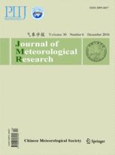
Journal of Meteorological Research
Advancing the Frontiers of Atmospheric Science.The Journal of Meteorological Research, published by SPRINGER HEIDELBERG, stands as a vital resource in the fields of Atmospheric Science and Ocean Engineering, boasting an impressive impact factor that reflects its scholarly significance. With its ISSN 2095-6037 and E-ISSN 2198-0934, the journal offers an open access platform, fostering accessibility and dissemination of cutting-edge research. Established in 2014 and running through to 2024, it is particularly distinguished in 2023 as Q2 in Atmospheric Science and Q1 in Ocean Engineering, underscoring its important contributions to these disciplines, with remarkable rankings in Scopus that place it in the top tiers of both categories. The journal accepts a broad range of research articles, reviews, and innovative methodologies, catering to a diverse audience of researchers, professionals, and students eager to advance their knowledge and expertise in meteorological studies. This makes the Journal of Meteorological Research an essential platform for anyone engaged in understanding and addressing the complex challenges of our changing climate.

JOURNAL OF GEOPHYSICAL RESEARCH-ATMOSPHERES
Unraveling the complexities of Earth's atmospheric processes.JOURNAL OF GEOPHYSICAL RESEARCH-ATMOSPHERES, published by the American Geophysical Union, is a leading peer-reviewed journal dedicated to advancing our understanding of atmospheric science and related disciplines. With an impressive impact factor and consistently holding a Q1 ranking across key categories including Atmospheric Science and Geophysics, this esteemed journal caters to a global audience of researchers, professionals, and students eager to explore groundbreaking studies and insights. The journal covers a comprehensive scope of topics, from climate dynamics to atmospheric processes, enhancing knowledge and informing practices within the realm of Earth and Planetary Sciences. With its strong emphasis on quality research, it remains a vital resource for those engaged in unraveling the complexities of our planet’s atmosphere. Explore this journal to stay abreast of significant developments and foster a deeper understanding in this ever-evolving field.

METEOROLOGY AND ATMOSPHERIC PHYSICS
Unveiling the Secrets of Our AtmosphereMETEOROLOGY AND ATMOSPHERIC PHYSICS is a premier journal published by SPRINGER WIEN, dedicated to advancing the study of atmospheric phenomena and weather-related sciences. With an ISSN of 0177-7971 and an E-ISSN of 1436-5065, the journal has established itself as an important contributor in the field, particularly noted for its contributions in atmospheric science, holding a Q3 ranking in the 2023 category quartiles. Covering a wide array of topics from meteorological modeling to the physics of the atmosphere, it serves researchers, professionals, and students alike, facilitating the dissemination of significant findings and innovative research. The journal’s acceptance of articles until 2024 encourages a continuous influx of knowledge, and despite its lack of Open Access, it plays a crucial role in enriching the academic landscape for those engaged in Earth and planetary sciences, holding a commendable rank of 78 out of 148 in Scopus. Located in the scenic city of Vienna, Austria, the journal is positioned to harness the vibrancy of the academic community, providing a platform for valuable insights that can drive forward the field of meteorology and atmospheric physics.
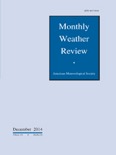
MONTHLY WEATHER REVIEW
Elevating Understanding of Atmospheric PhenomenaMONTHLY WEATHER REVIEW, published by the American Meteorological Society, is a leading journal in the field of atmospheric science, recognized for its rigorous peer-reviewed articles that contribute significantly to the understanding of weather patterns and climate systems. With an impressive Q1 ranking in the 2023 category quartiles and a strong standing (#41 out of 148) in the Earth and Planetary Sciences Scopus rankings, the journal serves as an essential resource for researchers, professionals, and students alike. Although it does not currently offer open access, its comprehensive coverage of meteorological research spanning from 1960 to 2024 makes it invaluable for those seeking to stay at the forefront of developments in weather analysis and prediction. Situated in Boston, Massachusetts, this journal not only showcases pioneering research but also emphasizes the importance of collaborative efforts in the meteorological community, ultimately contributing to advancements in our understanding of atmospheric phenomena.

JOURNAL OF HYDROMETEOROLOGY
Charting New Territories in HydrometeorologyJOURNAL OF HYDROMETEOROLOGY, published by the American Meteorological Society, is a leading scholarly journal that serves as a vital resource within the field of atmospheric science. With its ISSN 1525-755X and E-ISSN 1525-7541, this journal provides a platform for the dissemination of high-impact research, currently holding a prestigious Q1 ranking in Atmospheric Science as per the 2023 Category Quartiles. It enjoys an excellent reputation, ranked #30 out of 148 in the Scopus listings, placing it in the top 80th percentile within Earth and Planetary Sciences. Publishing rigorous and innovative studies from 2000 to 2024 and beyond, the journal addresses critical topics including weather forecasting, climate dynamics, and hydrological processes, making it essential reading for researchers, professionals, and students alike. Though not an open-access journal, it continues to enrich the academic community with quality contributions dedicated to advancing our understanding of hydrometeorological phenomena.
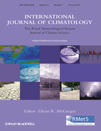
INTERNATIONAL JOURNAL OF CLIMATOLOGY
Navigating the science of climate for global impact.INTERNATIONAL JOURNAL OF CLIMATOLOGY, published by WILEY, is a leading peer-reviewed journal dedicated to advancing our understanding of climate science. As a prominent periodical within the Q2 category of Atmospheric Science, it encompasses a wide range of topics related to climatology, including climate variability, modeling, and impacts of climate change, making it an essential resource for researchers, professionals, and students in the field. With a history of publication spanning from 1989 to 2024, the journal has established a strong reputation for disseminating high-quality research that informs policy and practice. Though it does not offer Open Access options, its articles are accessible to a broad audience through institutional subscriptions, ensuring that significant findings can reach those who need them most. The INTERNATIONAL JOURNAL OF CLIMATOLOGY plays a crucial role in connecting academia with pressing environmental issues, thus fostering dialogue and innovation in climate research.
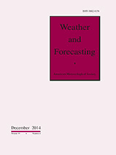
WEATHER AND FORECASTING
Decoding Weather Patterns for a Changing WorldWeather and Forecasting is a premier journal published by the American Meteorological Society, focusing on cutting-edge research in the field of atmospheric science. With its ISSN 0882-8156 and E-ISSN 1520-0434, the journal has distinguished itself within the scientific community, holding a Q1 ranking in Atmospheric Science for 2023 and ranking #56 out of 148 in the Scopus Earth and Planetary Sciences category, demonstrating its influence and high-quality content. Since its inception in 1992, Weather and Forecasting has been dedicated to advancing knowledge in meteorology through rigorous peer-reviewed articles that span a wide range of topics—from numerical weather prediction to climate impacts and atmospheric dynamics. While the journal is not open access, it remains accessible to a broad audience through institutional subscriptions, reinforcing its role as a vital resource for researchers, practitioners, and students alike. With a commitment to excellence in scholarship and a vision towards the future, this journal plays a significant role in shaping the understanding of weather phenomena and forecasting methodologies.